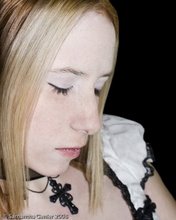So my most recent endeavor, and what has been eating up my time and causing me to forget that I do, in fact, have a blog; is a guide to explaining the absolute basics to photography.
How many times do people ask a photographer what camera they should buy, or what certain settings on their camera do? How many people read these long manuals that are so dry they can't truly grasp what it is they're reading, and in the end are left confused anyways?
The sad fact is, too many people are, and there aren't many guides out there that can explain these things in a way that is fun, and that a high school student can understand.
So, I decided I wanted to create a guide that would use analogies and photographs to explain the basic concepts behind photography. I'm not covering any special techniques or lighting; just the run of the mill camera.
I'm explaining apertures, shutter speeds, and megapixels. I'm covering what one should think about when considering purchasing a camera. I'm going over things that most people, as they learn, forget they once never knew.
As photographers, we often forget that we weren't born knowing the basics of photography. Along the way, either by going to school or through trial and error, we had to learn about aperture, shutter speed, ISO, and some sort of post processing; be it by use of chemicals in a darkroom or programs on a computer.
Frankly, the basics aren't that interesting either. So once you know them, you tend to forget that learning process because it sucks, in plain English. There is nothing more dry than listening to someone explain aperture and the likes when it comes to photography. As photographers, or aspiring photographers, we are of a creative mind. We don't tend to latch onto the technical, but instead the aesthetics. We're visual-minded people, and visual-minded people don't really care about the geometry behind apertures, they just want to know what setting to use to get the photograph to look right.
Because of this, my guide is going to skip over a lot of the more dry parts of photography, and instead explain things in a much more creative way. Analogies, photographic examples, and fun scenarios are just a few ways that I'm using to convey the idea.
After all, who needs to know that there's a formula behind why an aperture of 22 is capable of producing sharper photos than an aperture of 5.6, when you can show them a photo of the difference and say "this is what it does, remember that."
I love photography, and so part of my way to share that love is to create a guide that anyone can understand. And the first place I plan on sending it is back to my high school art teacher who hated the book we had to take notes from in photography for being too dry, so that she has something better to spice class up with.
I'm not sure if I'm going to try and get it published or not, but considering I'm at nine pages and going, with plenty of information left uncovered so far, I just might consider publishing. We'll see how it goes
For the most part though, I'll probably just release it online to start.
Friday, January 22, 2010
Tuesday, January 5, 2010
Beginnings--Welcome 2010!
It's 2010, and many are marking it as a time of new beginnings. It's the beginning of a new decade for those who don't care about getting super-technical, and for many, it's hoped to be the beginning of the economic recovery. There are people all over vowing to make a new start with this new year, and to better themselves. Resolutions are being made, and this year they're strong goals--things you can believe in. 2010 feels like the beginning of a year of cleansed souls.
But it's not the only beginning that has ever happened in my life, and I'm sure it's not for others, either.
As such, I'd like to go back in time, and share my beginnings in photography. It's important to know who you are, and where you come from, when it comes to moving forward. This is especially true in the artistic world--be it photography, drawing, dance, writing, ect.
Because of this, I urge you to blog about where YOU began as an artist as well! And then leave me a comment here with the link, or get the link to me somehow, and I will add it to the end of this entry.
My beginnings in photography, my TRUE beginnings, did not start when I was taking snapshots with my little 35mm point-and-shoot Olympus camera. Yeah, I'm sure some of you don't remember when that was top-of-the-line for regular consumers, being how far in to the digital age we are, but I am just young enough to have been a part of the last generation that coveted such cameras. I was given it when I was 9 years old, and I took it on every trip with me. My parents would buy me a box of film (the four packs), and I'd go to town.
But that wasn't my true beginning. Back then it was just fun, and I felt awesome because I had a camera just like the grown-ups. I wasn't serious about photography though, and in fact I didn't even consider it as an art form. I just knew that at Easter Mom took myself and my two young siblings to get portraits done, and we had to sit still for what seemed like forever while this lady waved some sort of stuffed toy at us that squeaked, and that we had to do it again for school portraits as well (minus that stuffed toy).
My true beginnings in photography actually came when I was about 16, in High School. Art classes were the only things that got me through school, and so with the advent of an art class every day when I entered my freshman year (because in Middle School, it was only half the year), I was excited! Of course as a freshman we all had to take Studio Art, and sadly that did not touch on photography. But I learned some very important things in it.
1. I did not want to draw for a living like I had originally thought. In fact, drawing frustrated me to no end, and I kind of wanted to just break pencils instead of colouring with them.
2. Sculpture was not cool either, mainly because the projects took too long and didn't hold my interest.
3. Ceramics was cool, and so I ended up taking ceramics the next year... and they stopped being as cool as before.
4. I was going to be an artist, SOMEHOW, and that I would figure it out by taking Portfolio in my senior year.
So, with those four things figured out, and both Studio Art and Ceramics under my belt by the end of my sophomore year, I needed to figure out what I was doing for my junior year.
As I stated above, Drawing & Painting, and Sculpture were out of the question. I was waiting for my senior year to take Portfolio, and I'd already completed Studio Art and Ceramics. At this time, my only option left was Photography. So I said to myself, "How hard can this be?", and I signed up to try and get into it.
You have to understand, my graduating class had 67 students in it--we were not, and still aren't, a big school. So to get into a class like Photography, well, there were only 15 seats available because of the lack of proper equipment. I didn't know this was the reason at the time, but I did find out.
Somehow, I, a junior, made it into this class. I think my art teacher might have requested it, or we didn't have a lot of seniors that wanted in. I know it was a strange mixture of ages in the class though.
What I wasn't aware of when I signed up to be a part of this class, was that I was going to learn about apertures, and shutter speeds, and all that wonderful technical stuff that comes with photography. Granted, you didn't need an SLR for this class (because that'd be a bit much for high school), but you did need a 35mm film camera. Well, I was so excited about all these new things that I didn't want to use my little Olympus! So I asked my parents, and by golly, Mom had a Pentax that was a bit more involved than my Olympus. Unfortunately for me, it was very old (we're talking from the 60s or 70s here), and the shutter would stick open. So rather than pay to get it cleaned when we went to the camera store, my parents invested in a 35mm SLR for me. It was a Nikon N75 with a wide-angle zoom lens that also had some macro capabilities, and I was perfectly happy about that.
So now, armed with an SLR and b+w film, I was off to start my adventures in photography. Not only did I learn about shutter speeds, and apertures, and techniques that I didn't really understand; I had to learn about the darkroom too.
In our darkroom, there were three enlargers that were in various states of working condition, and one broken one. There was a big basin sink with our developer, stop bath, and fixer; and then we had a table with a squeegee board and a big mesh rack for drying. The only thing we hung to dry was our film strips right after we'd developed them. The things I remember best though, was that touching the time clock with wet hands would get you zapped, and that of the enlargers the middle one had the weakest light.
During my year in photography, I was constantly being complimented on my photos, and urged to do more with it. And it was an art class that I truly enjoyed, and got in to. In fact, during this year when I had my serious bout with clinical depression (and ended up getting meds for), the class I caught my work up in fastest wasn't any of my core classes required for graduation, it was photography. And during the days that I just didn't bother doing anything else, I was constantly walking around with the DSLR (Canon Rebel xT) my family had decided to buy taking photos of what I saw. A few of these weren't that bad, either.
By the end of the year, I was starting to think that maybe photography wouldn't be such a bad idea. In fact, with the urging of my art teacher, I decided that I was going to apply to be a student at the elite Hallmark Institute of Photography. And I was accepted.
So before I even began my senior year, I knew where I was attending college. And I never stopped shooting. Unfortunately for me, while Hallmark provided a great technical background, they didn't do much for creativity. In fact, they killed my creativity almost completely with stress. And we're not talking the kind of stress you get from just having some finals to complete, or a project coming to deadline. We're talking stress so bad that five kids (that I knew at least) tried to commit suicide (my upstairs neighbor took a whole bottle of pain pills and went into a coma for three days, and no one knew until she showed back up looking like hell), and when the final portfolios were all handed in 90% of the class went out to a bar and got totally wasted. I don't think any of them remember that night at all. The stress of completing two years worth of knowledge in ten months was extreme, but what was worse was that everything you had accomplished up until that final portfolio meant nothing. So your entire graduation depended upon twenty-eight photos you had about ten weeks to complete. You could not use your fellow students in any of the required shots, and you could not use the same model twice. You had to find families, and buildings (and get permission to photograph inside them!), and business executives; and oh many other things as well. But the kicker was that the school would not help with any of this, except to post a few bulletins of people they knew who were looking for photos. Basically, we were running around like chickens with our heads chopped off.
There was limited shooting space, limited time to see our instructors to get advice, and it was just plain a mess. In the end, there were four of us who failed out the day before graduation, because our photography just wasn't good enough.
You had two reviews there. The first done by three photographers who judge your work and decide if you pass or fail, and give you a "critique". In most cases, they either adored your work, or hated it. And they let you know. Only one had any tact in delivering a critique. But the worst part is that this happened in front of the entire school.
Then if you bombed that first review, you were told what you needed to fix, and had about five days to do so before re-review happened and you were either graduating the next day, or you weren't. This time there was no explanation given.
I failed this school, and it was a big blow to my self esteem at that time. But I was not going to just lay down and take it, and so when the President of the school came to offer his condolences, I told him to his face that this was not going to stop me from being a photographer. And what do ya know, he offered to meet with me a week later and help me out.
He didn't know what to do when he actually looked at my portfolio that I had prepared. All he could tell me was that four of the twenty-eight images weren't of Hallmark quality, and at least fourteen were portfolio material; that and that I didn't need any more help like he thought I would. So basically, I had passed, but my teachers who re-reviewed my portfolio didn't think so. Oh well, he still couldn't give me my certificate (yeah, no degrees here), and I really don't care to this day.
Why? Because after leaving Hallmark, I realize that it gave me the technical background I needed to bring my ideas to life. After leaving Hallmark I got a hold of a Nikon D200 with two lenses, some basic filters, and I traded my Mamiya in for a nice light kit from Profoto via the Mac Group. I was set. I had Lightroom, a CS3 Adobe suite, a website, and the knowledge.
From that day forward, every time I have picked up a camera it has been a learning experience. I revisit the basics, practice techniques I want to learn over and over again until I understand them, and read any book I can get my hands on to keep my ideas fresh. And I let go of the elitist attitude that Hallmark was trying to give its students and the education they were receiving, because they are not all they're cracked up to be.
Do I regret any of it? No, not really. Hallmark is a great school to learn at, they just have bad business practices. And my HS experience was necessary to get to to realize all this, even if I did go through some serious depression that year.
In fact, to this day if I go in to visit my old art teacher, she will give me helpful advice on my photography and promotes my work as she can. She even modeled for me while I was in Hallmark. Truly, she was, and still is, my mentor and my idol. Everyone should have one, because when the going gets rough you need that person to slap some sense back into you, put you back on your feet, and shove you forward.
So where did it leave me? Well, I'll show you.
This image is from when I was in High School, and is actually a scan of a print I did in the darkroom, minus the hideous border I was totally all about back then:
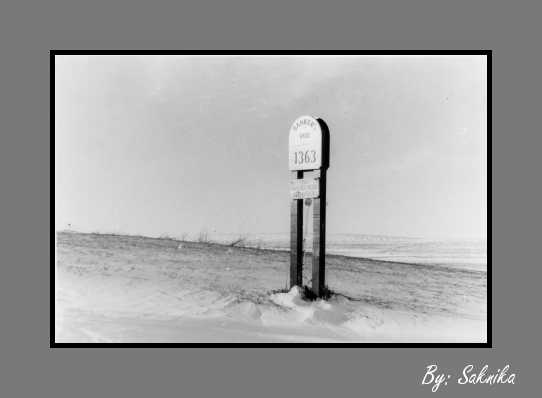
This is from my first experience that same year with a DSLR. It was taken at Yaddo, in Saratoga Springs, NY. Truly a wonderful place to visit if you're ever in the area.
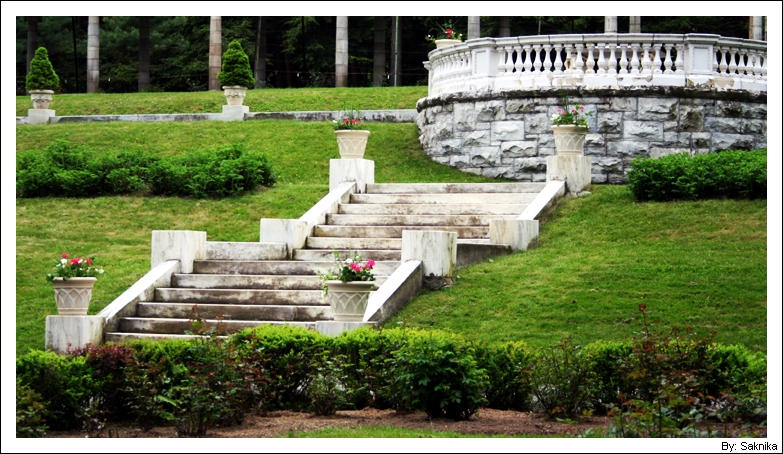
In my senior year, I dabbled with some portrait-type work. Really, I just wanted to have fun with people.
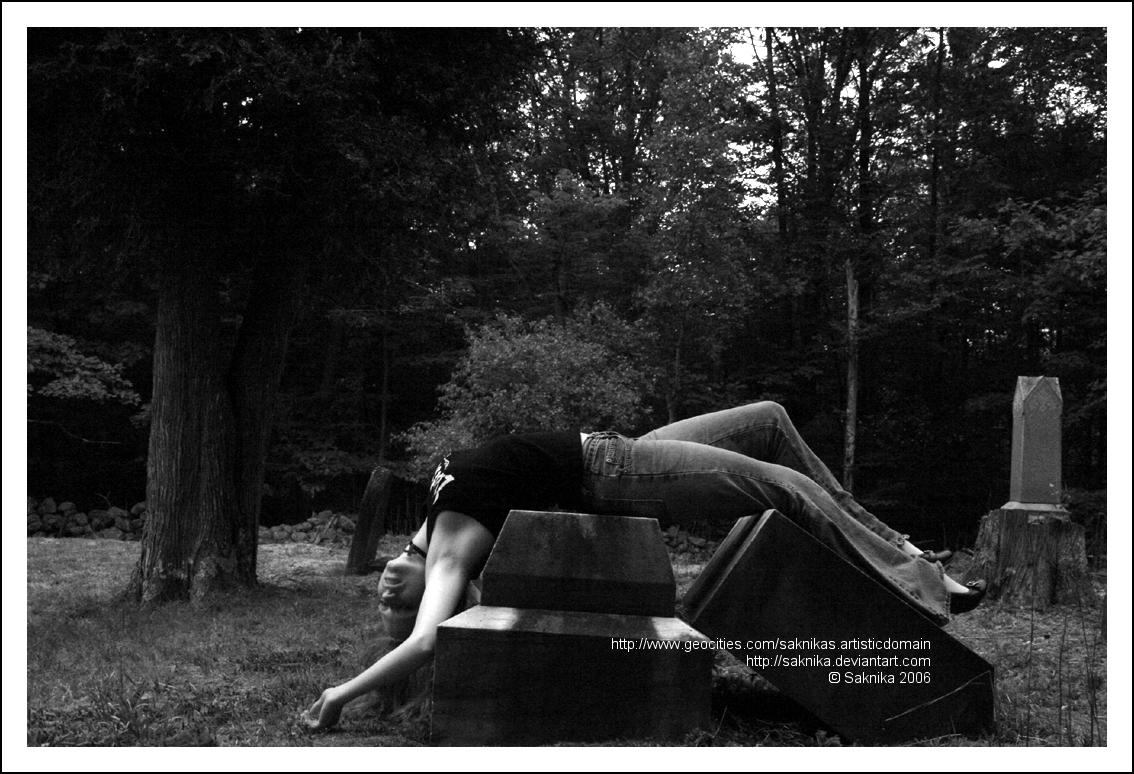
By the summer after my senior year, I was playing with long exposures

Hallmark started out okay, when there was little stress...
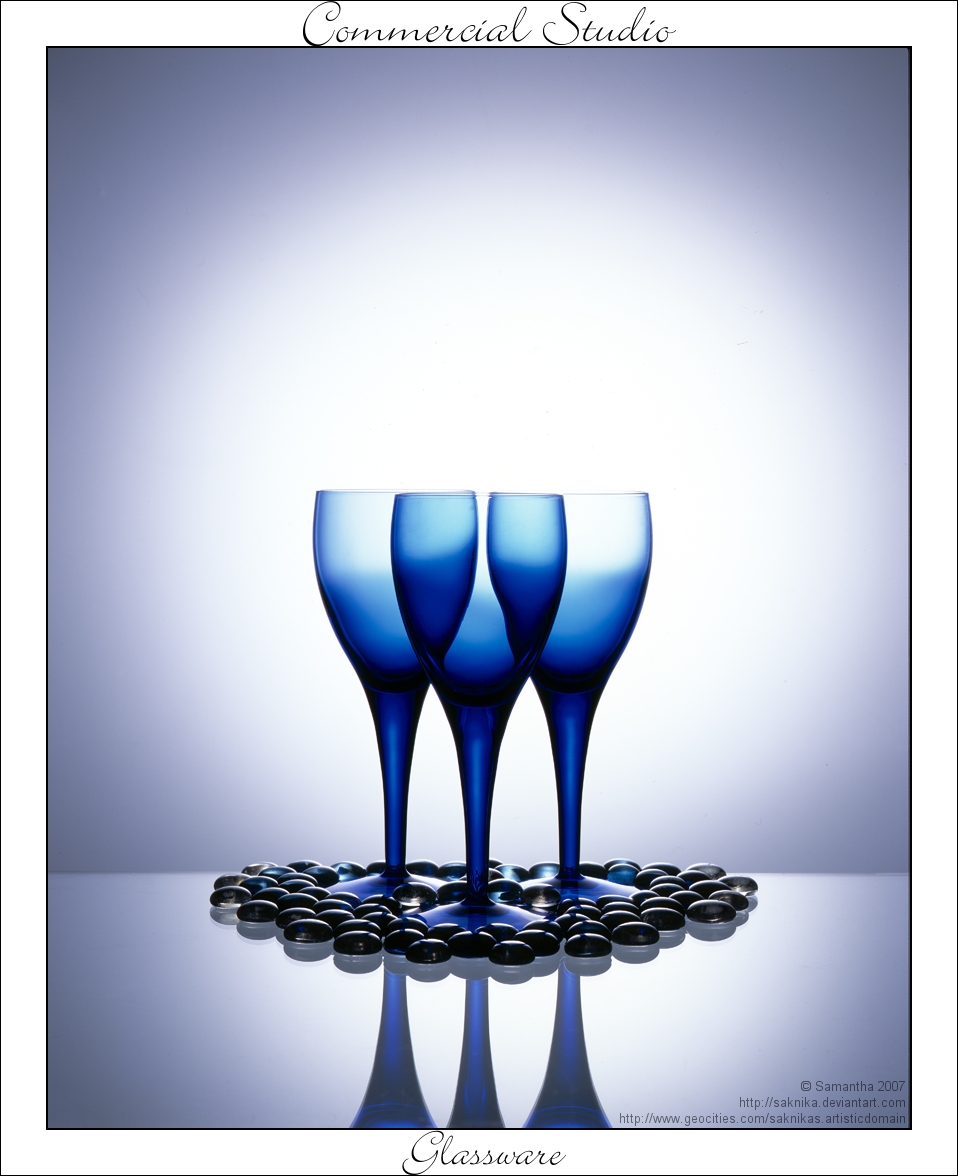

And ended bad, when stress was high...


After leaving Hallmark, I started to get my creative groove back.
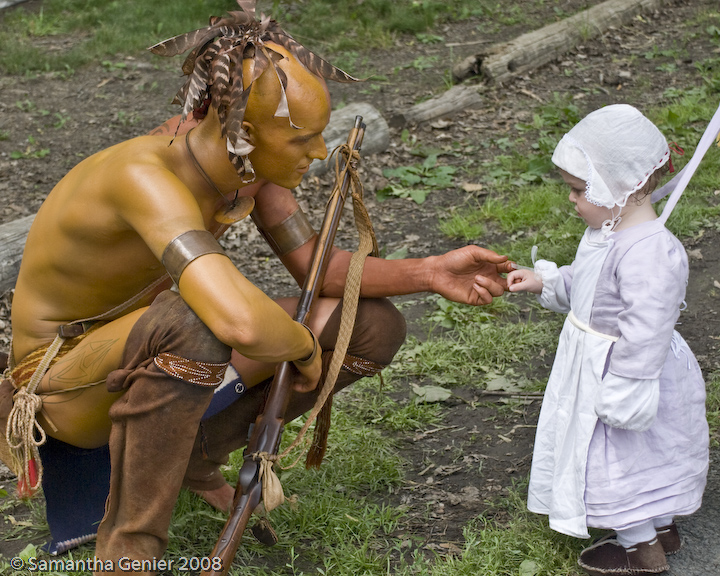
And now I'm here!


I'm 20 now, still shooting, and I plan to be until the day I die.
SO! Where did your artistic journey start? And where has it lead you?
Read about these other peoples' beginnings here!
None yet, send me some! C:
But it's not the only beginning that has ever happened in my life, and I'm sure it's not for others, either.
As such, I'd like to go back in time, and share my beginnings in photography. It's important to know who you are, and where you come from, when it comes to moving forward. This is especially true in the artistic world--be it photography, drawing, dance, writing, ect.
Because of this, I urge you to blog about where YOU began as an artist as well! And then leave me a comment here with the link, or get the link to me somehow, and I will add it to the end of this entry.
My beginnings in photography, my TRUE beginnings, did not start when I was taking snapshots with my little 35mm point-and-shoot Olympus camera. Yeah, I'm sure some of you don't remember when that was top-of-the-line for regular consumers, being how far in to the digital age we are, but I am just young enough to have been a part of the last generation that coveted such cameras. I was given it when I was 9 years old, and I took it on every trip with me. My parents would buy me a box of film (the four packs), and I'd go to town.
But that wasn't my true beginning. Back then it was just fun, and I felt awesome because I had a camera just like the grown-ups. I wasn't serious about photography though, and in fact I didn't even consider it as an art form. I just knew that at Easter Mom took myself and my two young siblings to get portraits done, and we had to sit still for what seemed like forever while this lady waved some sort of stuffed toy at us that squeaked, and that we had to do it again for school portraits as well (minus that stuffed toy).
My true beginnings in photography actually came when I was about 16, in High School. Art classes were the only things that got me through school, and so with the advent of an art class every day when I entered my freshman year (because in Middle School, it was only half the year), I was excited! Of course as a freshman we all had to take Studio Art, and sadly that did not touch on photography. But I learned some very important things in it.
1. I did not want to draw for a living like I had originally thought. In fact, drawing frustrated me to no end, and I kind of wanted to just break pencils instead of colouring with them.
2. Sculpture was not cool either, mainly because the projects took too long and didn't hold my interest.
3. Ceramics was cool, and so I ended up taking ceramics the next year... and they stopped being as cool as before.
4. I was going to be an artist, SOMEHOW, and that I would figure it out by taking Portfolio in my senior year.
So, with those four things figured out, and both Studio Art and Ceramics under my belt by the end of my sophomore year, I needed to figure out what I was doing for my junior year.
As I stated above, Drawing & Painting, and Sculpture were out of the question. I was waiting for my senior year to take Portfolio, and I'd already completed Studio Art and Ceramics. At this time, my only option left was Photography. So I said to myself, "How hard can this be?", and I signed up to try and get into it.
You have to understand, my graduating class had 67 students in it--we were not, and still aren't, a big school. So to get into a class like Photography, well, there were only 15 seats available because of the lack of proper equipment. I didn't know this was the reason at the time, but I did find out.
Somehow, I, a junior, made it into this class. I think my art teacher might have requested it, or we didn't have a lot of seniors that wanted in. I know it was a strange mixture of ages in the class though.
What I wasn't aware of when I signed up to be a part of this class, was that I was going to learn about apertures, and shutter speeds, and all that wonderful technical stuff that comes with photography. Granted, you didn't need an SLR for this class (because that'd be a bit much for high school), but you did need a 35mm film camera. Well, I was so excited about all these new things that I didn't want to use my little Olympus! So I asked my parents, and by golly, Mom had a Pentax that was a bit more involved than my Olympus. Unfortunately for me, it was very old (we're talking from the 60s or 70s here), and the shutter would stick open. So rather than pay to get it cleaned when we went to the camera store, my parents invested in a 35mm SLR for me. It was a Nikon N75 with a wide-angle zoom lens that also had some macro capabilities, and I was perfectly happy about that.
So now, armed with an SLR and b+w film, I was off to start my adventures in photography. Not only did I learn about shutter speeds, and apertures, and techniques that I didn't really understand; I had to learn about the darkroom too.
In our darkroom, there were three enlargers that were in various states of working condition, and one broken one. There was a big basin sink with our developer, stop bath, and fixer; and then we had a table with a squeegee board and a big mesh rack for drying. The only thing we hung to dry was our film strips right after we'd developed them. The things I remember best though, was that touching the time clock with wet hands would get you zapped, and that of the enlargers the middle one had the weakest light.
During my year in photography, I was constantly being complimented on my photos, and urged to do more with it. And it was an art class that I truly enjoyed, and got in to. In fact, during this year when I had my serious bout with clinical depression (and ended up getting meds for), the class I caught my work up in fastest wasn't any of my core classes required for graduation, it was photography. And during the days that I just didn't bother doing anything else, I was constantly walking around with the DSLR (Canon Rebel xT) my family had decided to buy taking photos of what I saw. A few of these weren't that bad, either.
By the end of the year, I was starting to think that maybe photography wouldn't be such a bad idea. In fact, with the urging of my art teacher, I decided that I was going to apply to be a student at the elite Hallmark Institute of Photography. And I was accepted.
So before I even began my senior year, I knew where I was attending college. And I never stopped shooting. Unfortunately for me, while Hallmark provided a great technical background, they didn't do much for creativity. In fact, they killed my creativity almost completely with stress. And we're not talking the kind of stress you get from just having some finals to complete, or a project coming to deadline. We're talking stress so bad that five kids (that I knew at least) tried to commit suicide (my upstairs neighbor took a whole bottle of pain pills and went into a coma for three days, and no one knew until she showed back up looking like hell), and when the final portfolios were all handed in 90% of the class went out to a bar and got totally wasted. I don't think any of them remember that night at all. The stress of completing two years worth of knowledge in ten months was extreme, but what was worse was that everything you had accomplished up until that final portfolio meant nothing. So your entire graduation depended upon twenty-eight photos you had about ten weeks to complete. You could not use your fellow students in any of the required shots, and you could not use the same model twice. You had to find families, and buildings (and get permission to photograph inside them!), and business executives; and oh many other things as well. But the kicker was that the school would not help with any of this, except to post a few bulletins of people they knew who were looking for photos. Basically, we were running around like chickens with our heads chopped off.
There was limited shooting space, limited time to see our instructors to get advice, and it was just plain a mess. In the end, there were four of us who failed out the day before graduation, because our photography just wasn't good enough.
You had two reviews there. The first done by three photographers who judge your work and decide if you pass or fail, and give you a "critique". In most cases, they either adored your work, or hated it. And they let you know. Only one had any tact in delivering a critique. But the worst part is that this happened in front of the entire school.
Then if you bombed that first review, you were told what you needed to fix, and had about five days to do so before re-review happened and you were either graduating the next day, or you weren't. This time there was no explanation given.
I failed this school, and it was a big blow to my self esteem at that time. But I was not going to just lay down and take it, and so when the President of the school came to offer his condolences, I told him to his face that this was not going to stop me from being a photographer. And what do ya know, he offered to meet with me a week later and help me out.
He didn't know what to do when he actually looked at my portfolio that I had prepared. All he could tell me was that four of the twenty-eight images weren't of Hallmark quality, and at least fourteen were portfolio material; that and that I didn't need any more help like he thought I would. So basically, I had passed, but my teachers who re-reviewed my portfolio didn't think so. Oh well, he still couldn't give me my certificate (yeah, no degrees here), and I really don't care to this day.
Why? Because after leaving Hallmark, I realize that it gave me the technical background I needed to bring my ideas to life. After leaving Hallmark I got a hold of a Nikon D200 with two lenses, some basic filters, and I traded my Mamiya in for a nice light kit from Profoto via the Mac Group. I was set. I had Lightroom, a CS3 Adobe suite, a website, and the knowledge.
From that day forward, every time I have picked up a camera it has been a learning experience. I revisit the basics, practice techniques I want to learn over and over again until I understand them, and read any book I can get my hands on to keep my ideas fresh. And I let go of the elitist attitude that Hallmark was trying to give its students and the education they were receiving, because they are not all they're cracked up to be.
Do I regret any of it? No, not really. Hallmark is a great school to learn at, they just have bad business practices. And my HS experience was necessary to get to to realize all this, even if I did go through some serious depression that year.
In fact, to this day if I go in to visit my old art teacher, she will give me helpful advice on my photography and promotes my work as she can. She even modeled for me while I was in Hallmark. Truly, she was, and still is, my mentor and my idol. Everyone should have one, because when the going gets rough you need that person to slap some sense back into you, put you back on your feet, and shove you forward.
So where did it leave me? Well, I'll show you.
This image is from when I was in High School, and is actually a scan of a print I did in the darkroom, minus the hideous border I was totally all about back then:

This is from my first experience that same year with a DSLR. It was taken at Yaddo, in Saratoga Springs, NY. Truly a wonderful place to visit if you're ever in the area.

In my senior year, I dabbled with some portrait-type work. Really, I just wanted to have fun with people.

By the summer after my senior year, I was playing with long exposures

Hallmark started out okay, when there was little stress...


And ended bad, when stress was high...


After leaving Hallmark, I started to get my creative groove back.

And now I'm here!


I'm 20 now, still shooting, and I plan to be until the day I die.
SO! Where did your artistic journey start? And where has it lead you?
Read about these other peoples' beginnings here!
None yet, send me some! C:
Subscribe to:
Comments (Atom)
